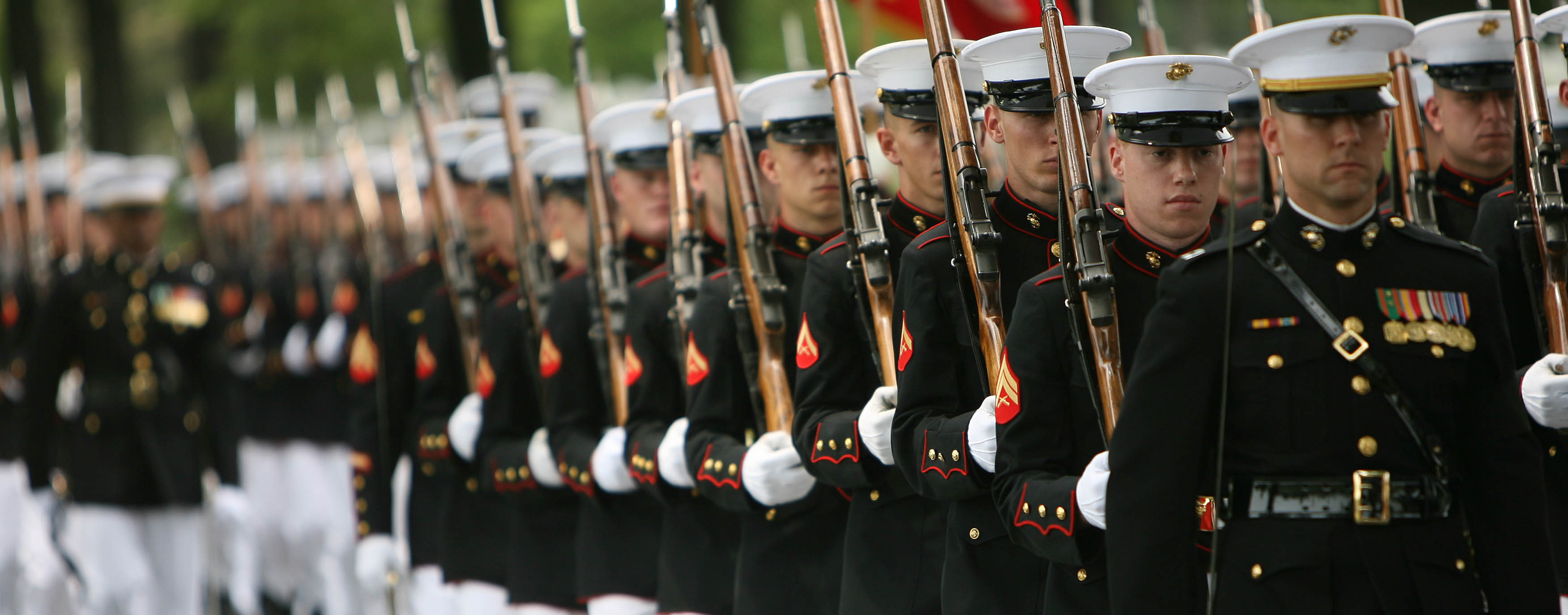On Identity: Loving The Part Of You That Isn't Dutch From Predator
I never meant to be a lifer. My father was a Marine Captain. He joined, served, and moved on. My grandfather was a Marine PFC and machine gunner in G/2/29. He took three bullets at Sugar Loaf Hill on Okinawa, came home, and got on with his life. The Marine Corps marked both of them, but it wasn’t either of their identities. Colored by that, I imagined I would join the Corps, have some life-defining combat experience that would imbue me with wisdom, gravitas, and a mysterious air irresistible to women, then move on to an equally fascinating civilian life.
Unfortunately, combat was essential to all of that and combat has a way of happening at the speed of history. When it finally came in 2004, I had somehow been a Marine for a decade. It’s been another decade and a half since then, in which I’ve added a wife and daughter, some graduate degrees, a few pounds, and a few gray hairs.
Now, as I begin to wind down what will be more than a quarter-century in the Corps when I clear CIF for the last time, I often think about how I will live the second half of my life. In the way of men who suddenly find themselves inexplicably older, I contemplate things I did, things I could have done differently, and things I could still do.
Regardless, one thing is certain.
In a few years, I will walk out of the gates for the last time and when I do, I better be prepared to move forward. I am convinced that the only way to do that is by making a concerted effort to live an authentic life by showing my real face to the world; by living honestly with myself and those around me; by daring to pursue things I love even if they fall outside the parameters of the identity I’ve created.
So what kind of snake oil am I selling? The kind that says we should not fall into situations and lifestyles because we buy into some image created by groupthink and fear. The kind that tries to recognize the guy you worked so hard to become may not be who you are anymore, that maybe you never were, that maybe that’s why it’s been so hard to become that guy in the first place. I’m saying maybe wearing that skin is actually holding you back. I remember a Marine I admired very much telling me, “When I hang up the guns, it’s for good.” I didn’t understand that then because my identity was so wrapped up in the pursuit of being a guy with a gun. I get it now.
David Joy is a hunter, a farmer and a novelist whose work I admire very much. David told me that to be an artist, specifically a writer, I had to be “fearless and vulnerable.” At 6’5” and 250 pounds, he may be more comfortable than I in exposing his vulnerabilities. But I am increasingly applying his advice to every aspect of my life. Ironically, it was only when I made an affirmative decision to allow aspects of myself that had either been dormant or suppressed for two decades to flourish through writing that I started getting relatively effortless affirmation and success. Deciding to reinforce success rather than continually hammer square pegs into round holes has been liberating, but it took being willing to acknowledge my weaknesses as well as my strengths. More critically, it required me to truly be honest with myself about how I want to spend what time I have left on this earth and acknowledge that may not include the things that have characterized the last quarter century.
For many of us, especially those of us with relatively long tough guy resumes, being fearless and vulnerable about aspects of our personalities that don’t fit within the parameters of those resumes is almost painful. It demands introspection, self-awareness and personal critique. We risk the approbation of groups into which we worked very hard to gain acceptance, a challenge when you’ve been acculturated to serve team before self. Our validation is extrinsically generated and externally broadcast and is largely tied to the opinion of our peers and our institutions. More pointedly, as a friend and fellow Marine said to me of our younger days, “I think a lot of the things we did back then were driven by vanity”. Extrinsic reward that achieves a critical objective like preparing one for combat is not bad. But extrinsic validation is not nearly as genuinely, personally valuable as intrinsic motivation and reward.
Larry Krieger is a writer and professor who studies lawyers and happiness. His studies show that “experiences of autonomy (including authenticity), relatedness to others and competence most strongly predicted attorney well-being… choosing work for internally motivated reasons (i.e., for enjoyment, interest or meaning within subjects’ belief systems) was also very highly predictive of well-being”.
So why are so many of us pursuing inauthentic or incomplete identities? I contend many of us cloak essential truths about ourselves in inauthenticity. We believe our own self constructed mythologies. By so doing we shortchange ourselves. To get the most out of our lives we have to identify whether we are living the life that truly reflects who we are or whether we are just pursuing of an idea of who we wish we were or want others to think we are. In other words, too many of us are living inauthentically.
In our collective defense, those of us who have grown up in familial, social or professional cultures that instill specific values, norms, and modes of thought may not even know we’ve done it. Some of us feel bizarre guilt about pursuing the things that actually make us happy because those things don’t fit within the image we’ve built for ourselves and others. We may even be truly competent at the things we do. But if we feel some tug that tells us this isn’t right, we probably ought to at least consider the message inherent in that. The only way out of that trap is radical honesty about ourselves to ourselves and others because it leaves us no more room to manufacture an inauthentic reality.
That’s hard and frankly scary. It requires making yourself fearless about and vulnerable to your individual reality. You may be unwilling to ask the simple question; “Who am I behind the face I show the world?” But you must in order to progress. The funny thing is, your family and friends probably already know the answer. They may have even told you. Whether you’re ready to hear it though, that’s the tricky part.
According to military lore, in 1944, as General Eisenhower circulated amongst the men of the 101st Airborne in the pre-dawn hours of D-Day, he asked a young paratrooper whether he really liked jumping from aircraft in flight. The story goes that the young man looked the Supreme Allied Commander in the eye and said, “No, Sir. But I like being with men who do.” That story is probably apocryphal but it communicates a truth. We should all know ourselves as well as that paratrooper. We should all understand completely why we do the things we do.
Those who know me best often tell me I should be writing or teaching for a living. I’ve got a million reasons at the ready why they’re wrong because for more than two decades I’ve identified myself as a Marine Officer, a Recon Marine, and a Marine Raider.
But if I’m honest, the times I’ve been happiest were not when I was standing on the ramp of a C130 at 0200, sucking down O2, about to leap into the darkness with a wall locker’s worth of gear strapped to me. It wasn’t kicking hard through dark water, following a compass heading as phosphorescence trailed off me and my dive buddy like effervescent green sparks. It wasn’t stacked up on a door with some truly great men, coiled like a spring, and waiting for the blast at the door to release us. Those experiences are all part of me but my happiest times are actually writing and teaching just like those who know me better than I do recognized. I’d much rather be typing this sentence than do those other things. But for years, not only did I not value the parts of myself that were unrelated to the Marine, I suppressed them and reinforced the Marine to their detriment.

Guy Sajer was a Frenchman from Alsace Lorraine who found himself fighting in the German Army on the Eastern Front during the Second World War. The Germans had a deservedly unhappy experience and when it was over, Sajer wrote in his autobiography, The Forgotten Soldier, “A day came when I should have died, and after that nothing seemed very important. So I have stayed as I am, without regret, separated from the normal human condition.” The sentiment struck me as a weighty, romantic way to characterize the gravitas I thought combat had imparted to me and I clung to it for years. Now it strikes me as the World War II version of a sheepdog T-shirt, and in adhering to it, I was cultivating an image that was not fully authentic to who I am. I don’t think I’m alone in falling into the trap of living a life not fully authentic to myself. As my mother and John Lennon famously said, “Life is what happens while you’re making other plans”. It’s time to make plans that reflect who I’ve become.
So who am I?
I am a career Marine and a combat veteran. It’s a large and important part of who I am, but like my father and grandfather before me, it no longer serves as the entirety of my identity. I am a guy who likes indie movies, small-press Southern literature, and the smell of wisteria in the spring. I’m a guy who buys way too many books and likes running ultra-marathons, not for the tough guy endurance aspect but for the absolute uncertainty of my finishing. I’m a man who is blessed with a wife that has carried the load my profession placed upon her with grace and dignity. I’m a guy who gets choked up when he drops his daughter off at elementary school and watches her walk in wearing a backpack as big as she is. Every. Damn. Time. For years I lessened my whole by suppressing the parts of me that I did not value as I valued the Marine. I placed myself in a cage of my own making, one that I alone can open. So I am opening it. Like my Father, I am writing and putting it out for the world to pass judgement upon. Like my Grandfather, I am becoming more involved in my community and extended family. Like both of them, I am looking to myself and the people most important in my life for approval rather than to faceless members of a massive organization. Perhaps most importantly, I am asking what it is I want to do with the last half of my life rather than trying to create a life I think others want from me and ironically, I think that is truly making me the man I want to be.
Russell Worth Parker is a retired Marine Corps Special Operations Officer. He likes barely making the cut-offs in ultra-marathon events, sport eating, and complaining about losing the genetic lottery.
Header Image Via https://www.savethecat.com/beat-sheets/predator-beat-sheet





